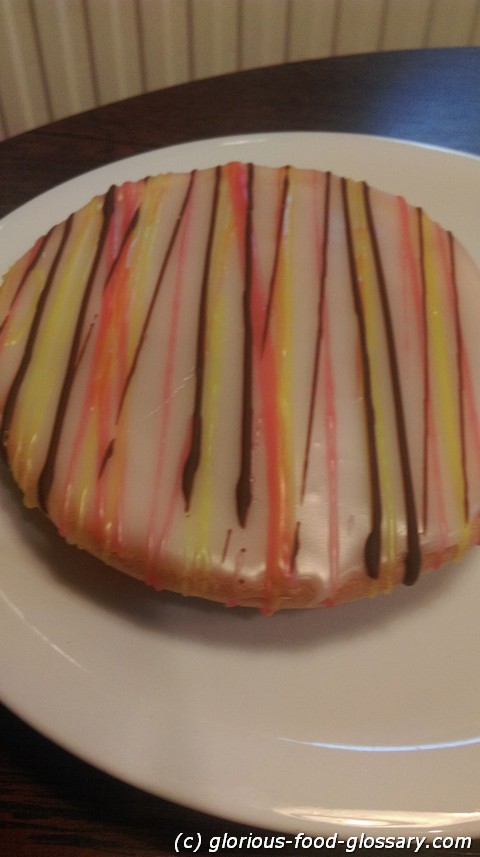Amerikaner literally translated to English as "Americans", refer to one of Germany's traditional baked goods, cake or cookies. There are 2 kinds/varieties of Amerikaner sold/available in almost all bakeshops/bakeries in Germany: (1) with plain vanilla Fondant frosting/icing on top of the round, conical shaped cookie; and (2) with vanilla Fondant frosting on one half of the cookie and a chocolate Fondant frosting on the other half. It is a typical German variety of the black and white cookie. However, many people do not know that the “Amerikaner“ neither comes from America nor is named after America. It was said that originally, Amerikaner derives its name from its chemical components - the leavening agent used for this special sort of cake is Ammonium Carbonate, a mixture of Ammonium Hydrogen Carbonate and Ammonium Carbamate. Since both terms start with “Ammonium“, the resulting product was called “Ammonikaner“. Maybe this origin of the naming was forgotten afterwards or a less promotional association with the unpleasantly smelling ammonia was created. Anyway, in the course of time, the “Ammonikaner“ has become an “Amerikanerâ€Â, and this is how this baked product is still called today in Germany.
Nowadays, Amerikaner is one of the well-known and traditional baked goods which is found in almost all bakeries in Germany. No bakery is without Amerikaner on their display racks.
My husband likes Amerikaner so much that we enerv fail to buy some when we visit a bakeshop. However, he prefers more the Amerikaner with just plain vanilla Fondant frosting/icing and we have a favorite bakeshop which sells what is for us "the best Amerikaner" in our city . The Back-Factory and Tenter's Backhaus. The dough is a bit fudgy, the frosting is thicker, and there is a lemony taste which makes their Amerikaner different from the rest.


Related Articles to the term 'Amerikaner' | |
| 'Marzipan Kranzkuchen / Marzipan Kranz' | ■■■■■■■ |
| Marzipan Kranzkuchen / Marzipan Kranz: Marzipan Kranzkuchen also called Marzipan Kranz refers to a German . . . Read More | |
| 'Baumkuchen' | ■■■■■■■ |
| Baumkuchen refers to one of the many traditional cakes from Germany, a German Tree Cake. It is a layered . . . Read More | |
| 'Dampfnudel' | ■■■■■■ |
| Dampfnudel refers to a German sweet which is a fluffy warm yeast dough with vanilla sauce Other definition: . . . Read More | |
| 'Gugelhopf' | ■■■■■■ |
| Gugelhopf refers to a kind of traditional cake, a ring cake available in Germany, Austriam Switzerland . . . Read More | |
| 'Speculaas' | ■■■■■■ |
| Speculaas refer to Dutch cookies which are are sold in different shapes, but the most traditional shape . . . Read More | |
| 'Konditoreien' | ■■■■■■ |
| Konditoreien is Namibia\'s term for \'cake shops\'. These cake shops sell German-inspired or German-influnced . . . Read More | |
| 'Bienenstich' | ■■■■■■ |
| Bienenstich is the German term which literally means \'bee sting\' is actually one of the traditional . . . Read More | |
| 'Black Forest Cake' | ■■■■■■ |
| In the food context, Black Forest Cake, known in German as \'Schwarzwälder Kirschtorte,\' is a famous . . . Read More | |
| 'German cuisine' | ■■■■■■ |
| German cuisine encompasses the traditional and regional culinary practices of Germany, shaped by historical, . . . Read More | |
| 'Clafouti' | ■■■■■■ |
| Clafouti refers to a traditional French dessert from the Limousin region. . . . . . . Read More | |
